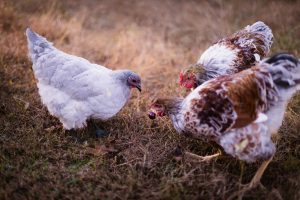All spring and summer long, our flock takes care of us. They give us tons of eggs on very little feed. If you let your chickens out to free range everyday, you get even more “bang for your buck.”
This all changes when cold weather sets in. Our chickens need us now, more than ever, to take care of their dietary needs.
While free-ranging during the warmer months, chickens easily fill their diet with everything they need. Chickens are omnivores, meaning they need to consume both vegetable matter and protein. Fresh grass and seeds are readily available in our yards during spring and summer. While, insects, like crickets, grubs,and grasshoppers, fill the protein void in their diet.
As we know, winter is a very lean time. There is little to no greenery for foraging. I live in Alabama, so the ground isn’t covered in a layer of snow, but none-the-less, the grass is brown and dead, making pickings lean. In climates up north, snow on the ground can make finding any goodies all but impossible for our poor flock.
Don’t despair! You can supplement your flock’s diet in lots of ways!

Greenery and Grains:
Plant Some Greens
- Leafy vegetables and grasses are very beneficial for a hen’s overall health. Plan ahead by dedicating a small plot of land to grow winter greens just for your chickens. Use organic, untreated seeds. Some great choices are romaine, clover, arugula, collard greens, turnip greens, dandelion, bitter cress, parsley, oregano, carrot tops, and kale. Cut the green tops off the plants, and serve to the chickens!
- Rye can be fed to chickens, and it grows well in winter. However, too much can give them sticky feces, so should be given in moderation.
- Spinach also should be fed in very small quantities as it contains oxalic acid. Oxalic acid, in high amounts, reduces the body’s ability to absorb calcium.
Soaked Alfalfa Cubes
- Available at most feed stores, dried alfalfa cubes are a great leafy addition. The cubes simply need to be soaked in water, and fed directly as a yummy mush. Alfalfa cubes are best, not the actual hay. The hay is too large and coarse for hens to consume.
Soaked Grains
- Soaked grains are a very popular and easy way to add probiotics to your flock’s diet. Soaking the grains, leads to fermentation. Fermented grains are easier for chickens to digest. The lactic acid built up in the process, ensures no bad bacteria can live. It has been shown to reduce the number of acid sensitive gut bacteria, such as E.Coli. Research also has proven hens produce thicker eggshells when fed this.
- To Make:
- 5 Gallon Bucket with Lid
- Fill 1/3 full of grains (oats, barley, wheat, corn, etc)
- Fully cover grains with chlorinated water (setting water out for 24 hours without a lid can allow the chlorine to evaporate)
- Grains must remain all the way submerged
- Room temperature, stir daily
- After 3-4 days, if you see bubbles, it is ready to serve!
Serve small scoopfuls everyday and just add back to amount you take away to the original mix. Do not use if it smells alcoholic or rancid.
Added Protein:
Table Scraps
- Table scraps are an economical and easy way to give extra food to your flock. Try to save them a little bucket of leftovers everyday, and they will absolutely love you! Some great ones include cooked veggies, seeds, cooked popcorn, cooked meats, leftover berries, and bread products (in moderation).
Fresh or Canned Fish
- Yes! Chickens can eat fish! They actually can consume it raw or cooked! Canned tuna, mackerel, sardines, or any white meat fish is acceptable. Fish is very high in protein and omega-3 fatty acids. Give it about once a week, as a snack!
Meal Worms
- Although pricey, chickens will go absolutely crazy over some delicious meal worms. Meal worms are high in healthy proteins and can be purchased freeze dried at most feed stores. Crickets purchased from a bait and tackle shop are also a great weekly winter treat, as well as enrichment!
Lastly, remember to give your flock grit.
In places of the country where it snows, the entire ground can be covered in snow, making it difficult for free-ranging birds to find the natural grit they need.
Grit should be supplied year round. If your flock has a large space outdoors to roam, they may can find enough small stones and grit on their own. Most feed stores will sell ground up oyster shells for chicken grit. Some feed stores are also offering “pigeon grit.” Pigeon grit can be given to chickens, but is called that because the pieces are small enough for farmers with small birds, like pigeons or pheasants. Pigeon grit is essentially tiny granules of granite, often dusted with a mix of vitamins and minerals.
Thanks for taking to time to read! Now you’ll be armed with all sorts of winter foraging tips and tricks!